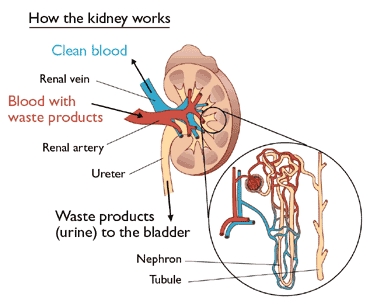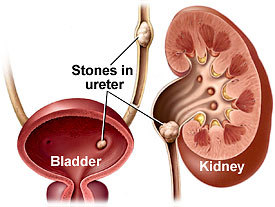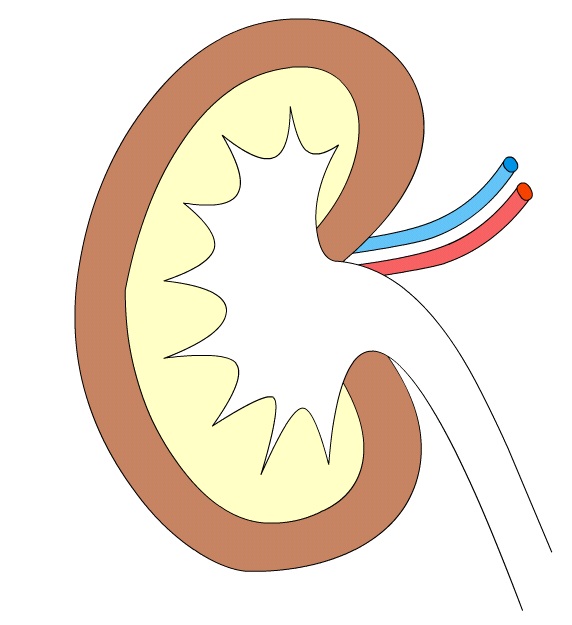The Excretory System | Period 3 Biology Honors
The
Kidneys
The kidneys and bladder make up an important part of the excretory system. Their major function is to filter out excess water and wastes from the blood and remove them from the body.
Each of the two kidneys in humans are about the size of a fist and the shape of a bean.
The kidneys and bladder make up an important part of the excretory system. Their major function is to filter out excess water and wastes from the blood and remove them from the body.
Each of the two kidneys in humans are about the size of a fist and the shape of a bean.
- First, the "dirty" blood with waste products enters the kidney from the renal artery.
- The blood passes through nephrons, in which the glomerus acts as a filter. The glomerus, or capillary, allows excess water and proteins to pass through into the tubule. The normal cells and proteins in the blood stay inside the glomerus and return to the blood stream through the renal vein.
- In the tubules, not all chemicals filtered out are bad; some may still be useful to the body. The tubule may allow some materials such as potassium that the body may still need to re-enter the bloodstream.
- The remaining wastes, which often include sodium, uracil, and phosphorous, combine with the excess water to form urine , which leaves the kidney through the ureter. Then, it is stored by the bladder.
The Excretory System
Click here
to
view an animation about how the
filtration system in the
kidney works.
filtration system in the
kidney works.
Vocabulary:
Glomerus: A tiny blood vessel (or capillary) found in the nephrons of the kidneys.
Nephrons: Units inside the kidney in which waste removal occurs; contain a glomerus and a tubule.
Tubule: A tube where the excess wastes and water in the bloodsream that have been filtered out by the semi-permeable membrane of the glomerus are stored.
Uracil: Chemical produced when liver
Urine: Fluid waste that is removed from the body by the filteration system of the kidney; usually includes excess water, sodium, uracil, phosphorous, and calcium.
Ureter: Where urine is stored before urinatrion.
Glomerus: A tiny blood vessel (or capillary) found in the nephrons of the kidneys.
Nephrons: Units inside the kidney in which waste removal occurs; contain a glomerus and a tubule.
Tubule: A tube where the excess wastes and water in the bloodsream that have been filtered out by the semi-permeable membrane of the glomerus are stored.
Uracil: Chemical produced when liver
Urine: Fluid waste that is removed from the body by the filteration system of the kidney; usually includes excess water, sodium, uracil, phosphorous, and calcium.
Ureter: Where urine is stored before urinatrion.

 Possible
Problems:
Possible
Problems:Some possible issues that can interfere with kidney function.
Kidney Stones:
Kidney stones are formed from excess material in the urine, such as sodium, calcium, struvite, or uric acid. These substances will crystalize and form stones, which take weeks or months to develop. Some kidney stones are small enough to pass nauturally out of the body with urine. Other stones may become too large, and require medical treatment. When stones are large, they may block the urinary tract, causing infection, buildup of urine, or kidney and nephron damage.
Kidney Failure:
When less than 15% of the nephrons in a person's kidney stop functioning, the person may be considered for dialysis or a transplant. Dialysis is when a machine is used as a kind of an "artificial kidney," filtering the blood which the kidney isn't able to.
